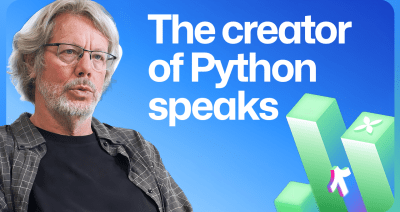9 tips to go from attendee to speaker at a tech conference
Here’s what you need to know to write a compelling session proposal and get on stage.

Our global developer and customer event, GitHub Universe, is back in-person and online later this year on November 8-9. (Make sure to save the date if you’re planning to attend!) That means it’s time to source the speakers and sessions that make Universe magical.
As someone who has managed event content programs for over a decade, I’ve read thousands of speaking submissions. I’m here to give you the inside scoop on what content committees look for and how to put your best foot forward to get accepted.
Here are some tips to help you stand out and increase your chances of being selected as a speaker this year. Already have a session idea in mind around AI, security, and developer experience? Submit it below!
How to write a winning session proposal 🥳
- Think about your session title like you would the subject line of an email—it needs to grab the attendee quickly and persuade them to read more. Don’t be afraid to have fun with it but make sure it is clear, concise, and compelling.
-
Be specific with your key takeaways. What exactly will someone leave your session knowing that they didn’t know before? These should be complete sentences and begin with words such as, “Gain insight into… learn… understand… discover…”
-
Convey that your topic is best served as a conference session. If it can only work as a blog post, then the content committee likely won’t accept it. Provide details on how you will make this experience unique for attendees and encourage participation in the event.
-
Have a friend outside of your industry review your content before you submit it. They might not understand the technical language but a fresh perspective is always a good idea. This is also helpful when it comes to practicing your talk prior to presenting.
-
Help the committee think about how your content will live beyond the event. Will your session inspire an opportunity to connect with attendees a few months later? Are you willing to do a follow-up podcast episode or write a recap blog post with insights from the session? We love to build partnerships with speakers and keep the conversation going after the event. If you’re willing to continue that relationship, let the committee know that.
-
Sessions are intended to be educational, not a sales pitch. Your content should be value-driven and prioritize solving a specific problem vs. featuring a product.
-
Show your passion. It’s essential to show your passion for the topic you’re planning to speak about. Share your enthusiasm and motivation for the subject matter, and explain why it matters to you personally.
-
Avoid “TBD” in your submission. The committee will have a hard time accepting an incomplete session. For example, if you’re submitting a panel, confirm all of your proposed panelists in advance and provide a sample of discussion questions. If you’re presenting findings from a survey, the survey should be done and you should have a general idea of what you’re going to share from it. Take the guesswork out of reviewing your submission and make it easy for the committee to understand what you’re proposing.
-
And here are some other ways you can do your homework prior to submitting:
- Read through recaps of the previous year’s events so you can see which sessions were popular and draw inspiration from them
- Contact former speakers to understand how they approached the process and ask for feedback on your submission
- Make sure you are aware of the latest issues and talking points in the industry. Subscribe to well-known blogs and newsletters, look up trending conversations on Twitter and LinkedIn, and check out any popular podcasts. The more well-versed you are in the sector, the more credible you will be as a potential speaker.
The formula to a great speaker bio 📝
Your speaker bio is another opportunity to drive interest in your session. Here’s the formula I usually provide prospective speakers and I recommend this be around 100 words:
= one great speaker bio! |
Here’s an example of that:
Rachel Heller is an event content professional with over a decade of experience working in the technology space (both in-house and on the agency side) on events ranging from 50 to 50,000 attendees. She leads content production for GitHub’s annual event, GitHub Universe. Prior to GitHub, Rachel held strategic event content roles at Bizzabo, PTC, and Sage. She is a member of the Event Content Council and serves on the content committee for the Corporate Event Marketing Association (CEMA) Summit. She is passionate about diverse, equitable, and inclusive presenter lineups and providing attendees with engaging content. When she’s not at work, Rachel enjoys hiking around New England, restoring furniture, and trying to beat her fastest time solving the crossword puzzle.
Additional resources from content committees 💡
Event content committees typically provide resources to interested speakers to guide submissions. Make sure to take advantage of them!
For example, the GitHub Universe team is providing the following information to potential speakers this year:
- Descriptions of each content theme, with specific emphasis on how to think about the track as a submitter vs. attendee.
- Title and abstract examples from Universe 2022 that performed well.
- An offline form that folks can use to draft their submission and receive feedback prior to formally applying.
- A list of frequently asked questions specific to the call for sessions.
- A support inbox staffed to answer any questions within 24 hours: speakersupport@github.com.
- This blog post 🙂.
Apply to speak at GitHub Universe 2023 🌟
Interested in speaking on AI, security, or developer experience? Here are some of the benefits you can expect if you’re selected:
- A complimentary pass to both days of GitHub Universe.
- An opportunity to share thought leadership with our global community of 100+ million developers.
- A speaker honorarium and travel and expenses covered.
- Access to a professional speaker coach.
- And more!
Applications are now open and close on June 7. Submit your session ideas today!
Tags:
Written by
Related posts

Why developers still flock to Python: Guido van Rossum on readability, AI, and the future of programming
Discover how Python changed developer culture—and see why it keeps evolving.

TypeScript’s rise in the AI era: Insights from Lead Architect, Anders Hejlsberg
TypeScript just became the most-used language on GitHub. Here’s why, according to its creator.

Completing urgent fixes anywhere with GitHub Copilot coding agent and mobile
Unlock the full potential of the GitHub platform. See how Copilot coding agent and GitHub Mobile combine to help you tackle development tasks and urgent fixes, no matter where you are.